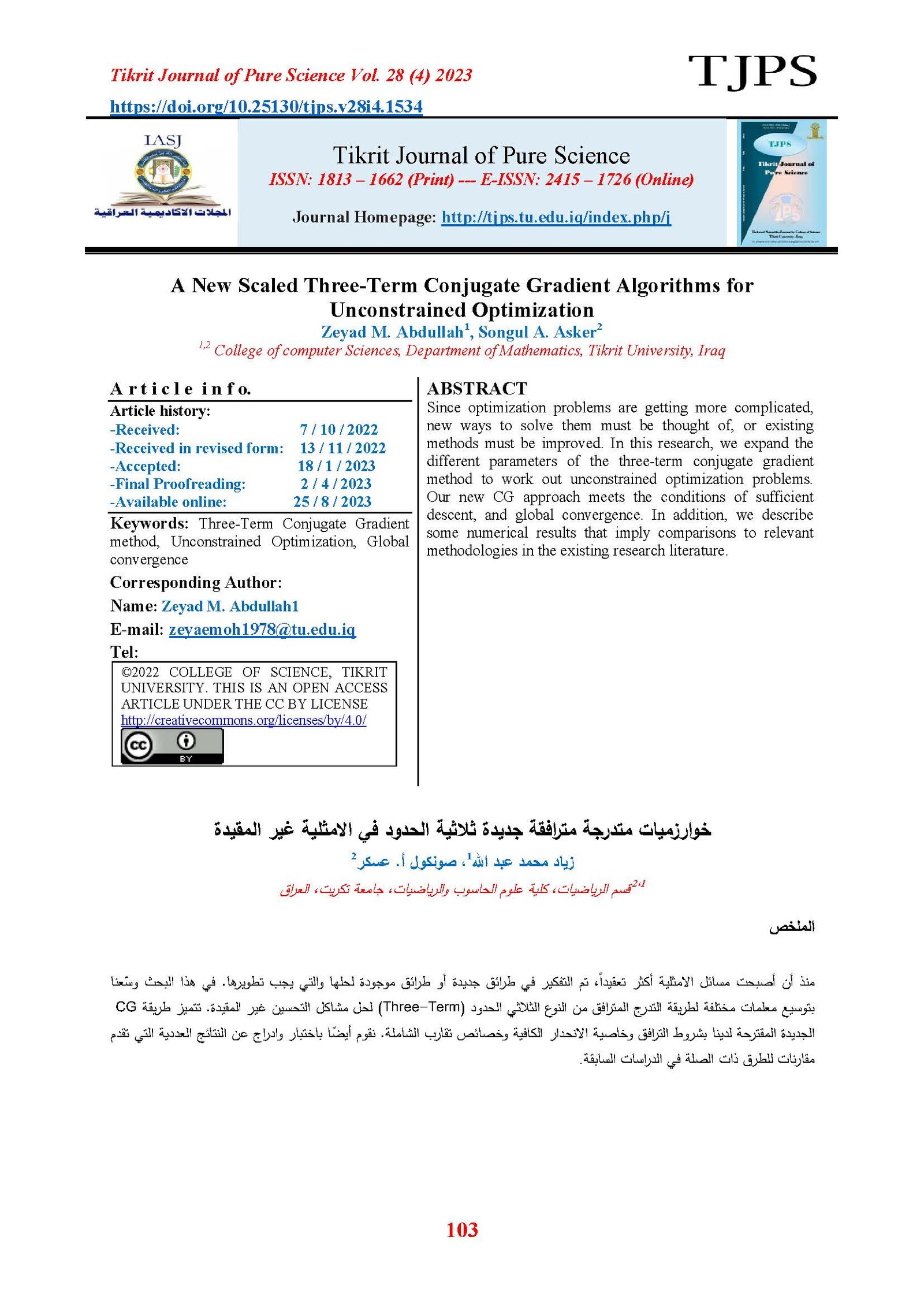A New Scaled Three-Term Conjugate Gradient Algorithms For Unconstrained Optimization
Main Article Content
Abstract
Since optimization problems are getting more complicated, new ways to solve them must be thought of, or existing methods must be improved. In this research, we expand the different parameters of the three-term conjugate gradient method to work out unconstrained optimization problems. Our new CG approach meets the conditions of sufficient descent, and global convergence. In addition, we describe some numerical results that imply comparisons to relevant methodologies in the existing research literature.
Article Details

This work is licensed under a Creative Commons Attribution 4.0 International License.
Tikrit Journal of Pure Science is licensed under the Creative Commons Attribution 4.0 International License, which allows users to copy, create extracts, abstracts, and new works from the article, alter and revise the article, and make commercial use of the article (including reuse and/or resale of the article by commercial entities), provided the user gives appropriate credit (with a link to the formal publication through the relevant DOI), provides a link to the license, indicates if changes were made, and the licensor is not represented as endorsing the use made of the work. The authors hold the copyright for their published work on the Tikrit J. Pure Sci. website, while Tikrit J. Pure Sci. is responsible for appreciate citation of their work, which is released under CC-BY-4.0, enabling the unrestricted use, distribution, and reproduction of an article in any medium, provided that the original work is properly cited.
References
[1] J. C. Gilbert and J. Nocedal, “Global convergence properties of conjugate gradient methods for optimization,” SIAM J. Optim., vol. 2, no. 1, pp. 21–42, 1992.
[2] A. Y. Al-bayati and R. S. Muhammad, “New Scaled Sufficient Descent Conjugate Gradient Algorithm for Solving Unconstraint Optimization Problems 1,” 2010.
[3] M. S. Jameel, Z. M. Abdullah, F. A. Fawzi, and B. A. Hassan, “A New Shifted Conjugate Gradient Method” Based” on Shifted Quasi-Newton Condition,” in Journal of Physics: Conference Series, 2021, vol. 1818, no. 1, p. 12105.
[4] L. Zhang and W. Zhou, “Two descent hybrid conjugate gradient methods for optimization,” J. Comput. Appl. Math., vol. 216, no. 1, pp. 251–264, 2008.
[5] M. J. D. Powell, “Some global convergence properties of a variable metric algorithm for minimization without exact line searches,” in Nonlinear programming, SIAM-AMS proceedings, 1976, vol. 9.
[6] L. Zhang, W. Zhou, and D.-H. Li, “A descent modified Polak–Ribière–Polyak conjugate gradient method and its global convergence,” IMA J. Numer. Anal., vol. 26, no. 4, pp. 629–640, 2006.
[7] O. A. ARIK, “Dissatisfaction levels of earliness and tardiness durations by relaxing common due date on single machine scheduling problems,” J. Multidiscip. Model. Optim., vol. 2, no. 1, pp. 1–15, 2019.
[8] A. Y. Al-Bayati and H. N. Al-Khayat, “A global convergent spectral conjugate gradient method,” Aust. J. Basic Appl. Sci., vol. 7, no. 7, pp. 302–309, 2013.
[9] Y.-H. Dai and Y. Yuan, “A nonlinear conjugate gradient method with a strong global convergence property,” SIAM J. Optim., vol. 10, no. 1, pp. 177–182, 1999.
[10] N. Andrei, “An unconstrained optimization test functions collection,” Adv. Model. Optim, vol. 10, no. 1, pp. 147–161, 2008.
